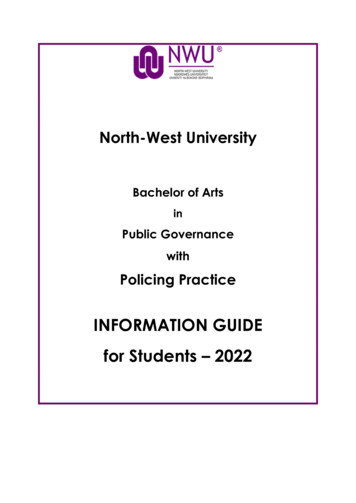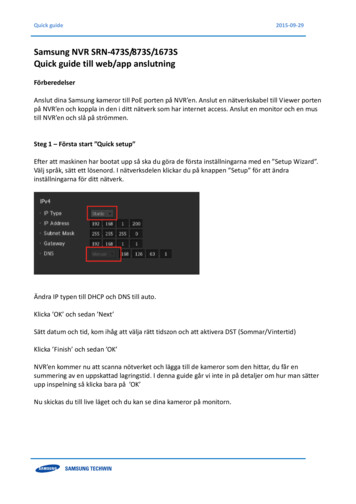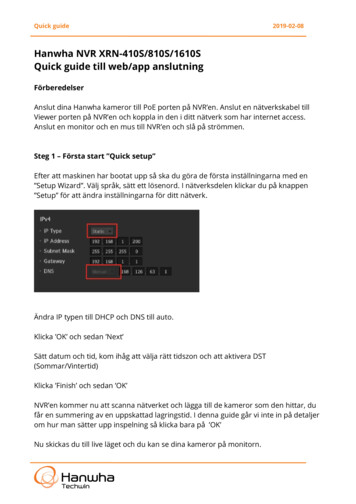
Transcription
North-West UniversityBachelor of ArtsinPublic GovernancewithPolicing PracticeINFORMATION GUIDEfor Students – 2022
“In its very essence, a university is and should be a place marked by reason, deliberation andthe free exchange of ideas.It upholds no dogma, which makes it different from a church.It follows no ideology, which makes it different from a political party.In the university, multiple voices are and should be heard without fear of reprisal.And throughout, rival ideas are subject to criticism and engagement, marked by the absenceof personal insult or pointed disdain.It is, moreover, a place in which the right to speak is upheld, especially when the speakerdiffers from the majority view or any other view.This space is a leveller where the voice of the worker matters as much, and should matter asmuch, as the voice of the professor.It is in this space where current and future leaders learn the habits of democracy such as thepower of thought and considered action to alter human futures.In the absence of such values and practices, an organisation can call itself many things, butnot a university.” Jonathan Janseni
TABLE OF CONTENTSContentsTABLE OF CONTENTS . iiWORD OF WELCOME . iii1 GENERAL INFORMATION.11.1Contact details .11.2Administration and logistics contact details.11.3Academic contact details .21.4Contact sessions .51.5Bridgit.51.6Panopto .61.7eFundi .61.7.1eFundi assistance.71.8Study centres .72.1Cancellation of studies .82.2.Termination of studies .82.3.Examination centres .82.4.Change of personal information .93.1.Language .103.2.Programme context .103.3.Duration of studies .113.4.Admission requirements and Recognition of Prior Learning (RPL).113.5.Programme outcomes .133.6.Programme structure .133.7.Study material .153.8.Assessment .163.8.3.3.9.3.9.1.3.10.Faculty policy on remarking .16Plagiarism .17Steps and procedures for plagiarism .18Time tables – Contact sessions and examinations .19ANNEXURE A: EFUNDI GUIDELINES .24ANNEXURE B: GENERAL ASSIGNMENT GUIDELINES .50ANNEXURE C: ASSIGNMENT COVER PAGE .53ii
WORD OF WELCOMEOn behalf of the School of Government Studies, a warm welcome to the BA Degree in PolicingPractice!Policing forms a critical part of our society and a constitutional imperative that seeks to maintainsecure environments for the citizens of the Republic. Our programme therefore aims to equipour graduates to exhibit exemplary knowledge and academic skills. In the School ofGovernment Studies, we also aspire to see our students develop into well-rounded individualsthat are engaged citizens, passionate about service delivery, and as critical thinkers. We wantyoutonotonlybecapableofunderstanding social,political,economicandgovernment contexts, but changing those contexts for the better. It is therefore our wish thatyour studies will, in addition to academic knowledge, equip you to be intellectually curious,socially conscious and appreciative of the richness of our multi-cultural society. Our hope is thatyou will use the knowledge and skills gained in your studies to serve as leaders in your workenvironments and communities, and actively engage in societal issues.You can be assured of our commitment to support you in your studies and in providing guidance.We are looking forward to partner with you on this journey that we hope would be an enrichingand rewarding experience to you.Wishing you great success!Prof Kedibone PhagoDirector: School of Government Studiesiii
1 GENERAL INFORMATION1.1 Contact detailsIn order to obtain efficient service, consider the tables below to establish the appropriateoffice/person to consult.1.2 Administration and logistics contact detailsPlease note that all enquiries pertaining to administrative or logistical matters should bedirected at the relevant person/office at the Unit of Distance Learning (UODL). The contactdetails are indicated below.CALL CENTRE018 285 5900DistancePotch@nwu.ac.zaAcademic ManagerDr Khumo Shopo u.ac.zaRegistrations and ancePotch@nwu.ac.za (Call Centre)MarksDistancePotch@nwu.ac.za (Call Centre)Study material and courier servicesMr Philip Malan DistancePotch@nwu.ac.zaStudy centresMr Zanele Jack ware (e.g., Bridgit, Panopto)uodl-elearning@nwu.ac.zaPlease noteAdministrative and logistical enquiries should not be directed to academic staff. Please use thedetails provided above.
1.3 Academic contact detailsPROGRAMME LEADERDr Barend PrinslooBarend.Prinsloo@nwu.ac.zaLecturers can be contacted for enquiries pertaining to academic matters only – enquiriespertaining to academic content. Please refrain from contacting your lecturers with regard toadministrative or logistical matters, these can be directed to the Academic Manager.Please note Lecturers are not always immediately available to respond to enquiries due to classes,meetings, workshops, etc. Lecturers will, however, respond to academic enquiries within48 hours from the time the enquiry was made, excluding weekends and public holidaysand unless they are out of the office for an extended period of time. When lecturers are out of the office for a period of time (attending conferences, leave,etc.), they will communicate the period of unavailability to respond to messages to youvia Announcements on eFundi. Please also note that you should ensure that enquiries on assignments, exams, etc. are notmade right before a due date, but well in advance to allow your lecturers time to respond.Remember lecturers have 48 hours to respond to enquiries. If your enquiry is made lessthan 48 hours prior to a due date, a timely response before the due date is not guaranteed.The BA in Public Governance (Policing Practice) is offered under the ambit of the School ofGovernment Studies (within the Faculty of Humanities); therefore, the lecturers for your two majormodules (Policing Practice and Public Administration) are located in the School of GovernmentStudies. Political Studies is also located in the School of Government Studies. The remainder ofthe modules offered in the programme are taught by lecturers from other schools/faculties. Thetables below provide the contact details for the lecturers of the various modules offered on theprogramme.2
POLICING PRACTICEModuleModule nameLecturerE-mail addressMr George Sekoane10819762@nwu.ac.zaMr George Sekoane10819762@nwu.ac.zaMr George Sekoane10819762@nwu.ac.zaMr George Sekoane10819762@nwu.ac.zaMs Chantele BloemChantele.Bloem@nwu.ac.zaMs Nonny MolebeleliNonny367@gmail.comMs Zanelle Biewenga25986635@nwu.ac.zaMs Theresa BowenTheresa.Bowen@nwu.ac.zacodePOMA 113Police Management: Statutoryand Regulatory framework forthe policing sectorPOMA 114Police Management: ServiceExcellence in the PolicePOMA 115Police Management: CrimePreventionPOMA 124Police Management:Community Service CentreManagementPOMA 212Police Management: Leadershipand ManagementPOMA 224Police Management:Cooperative governancePOMA 317Police management:Performance ManagementPOMA 323Police Management: ProjectManagementPUBLIC ADMINISTRATIONModuleModule nameLecturerE-mail addressPADM 111Introduction to Public AdministrationMs Katlego Sekwelekatlegosekwele98@gmail.comPADM 121Locus and Focus of PublicMs Chantele BloemChantele.Bloem@nwu.ac.zaDr Barend nPADM 211Public Financial ManagementFinal lecturer still to be decidedPADM 221Public Human ResourceMs Chantele BloemChantele.Bloem@nwu.ac.zaMs Thato Motswakaemotswakaethato@gmail.comDr Barend PrinslooBarend.prinsloo@nwu.ac.zaManagementPADM 311Organisational theoryPADM 312Research methods in PAPADM321Public PolicyMs Thato e and international PAMs Katlego Sekwelekatlegosekwele98@gmail.comFinal lecturer still to be decided3
HUMANITIESModuleModule nameLecturerE-mail addressDr Kristien Adrianatos13132873@nwu.ac.zaDr Nolukhanyo Metula37072064@nwu.ac.zaMs Lize-Marié Loubsertlmloubser@gmail.comDr Barend PrinslooBarend.prinsloo@nwu.ac.zacodeALDE 122COMS 121Academic LiteracyCommunication in theWorkforceSOCY 121Introduction to Sociology: SocialInstitutionsPOLI 123The South African Political SystemFinal lecturer still to be decidedSANL 214Urban Anthropology for Non-Ms Elanie Boshoffelaniebosh@gmail.comDr Barend CS223Understanding the WorldFinal lecturer still to be decidedPHIL 315African PhilosophyDr Barend PrinslooBarend.prinsloo@nwu.ac.zaFinal lecturer still to be decidedLAWModuleModule nameLecturerE-mail addressDr Barend PrinslooBarend.prinsloo@nwu.ac.zacodeCLLE 211Constitutional Law in LawEnforcementALLE 221Final lecturer still to be decidedLaw in Law EnforcementDr Barend PrinslooBarend.prinsloo@nwu.ac.zaFinal lecturer still to be decidedECONOMIC AND MANAGEMENT SCIENCESModuleModule nameLecturerE-mail addressMr Bongani Tejane25455842@nwu.ac.zacodePSDT 115Professional Skills DevelopmentFORP 214Forensic Legal AspectsMs Marilie Swartmarilie.swart@gmail.comFORP 225Forensic InvestigationProf Koos NortjeKoos.Nortje@nwu.ac.zaManagement4
1.4 Contact sessionsFirst-year students All contact sessions for first year students are offered via interactive Whiteboard sessions atvarious centres (see the list of study centres at section 1.9 below). Contact sessions for the programme are offered during Monday evenings (16:30 – 20:30)(please see section 3.10. for the timetable). For each module four (4) contact sessions will be scheduled during a semester. For somemodules five (5) contact sessions may be scheduled (please see section 3.10. for thetimetable). Students should arrive at the UODL venue at least 10 minutes prior to a contact session(please see section 3.10. for the timetable). Lecturers are required to ensure a level of interactivity during Whiteboard sessions.Second- and third-year students All lectures for second- and third-year students are pre-recorded and can be watchedonline (on Panopto) at your convenience (see section 1.6). The lectures relevant to Assignment 1, will be available at least three (3) weeks prior to thesubmission of Assignment 1. The lectures relevant to Assignment 2, will be available at least three (3) weeks prior to thesubmission of Assignment 2.Power point presentations First-year students – the power point presentation for each contact session will beavailable on the module’s eFundi site within 48 hours of the contact session. Second- and third-year students – the power point presentation for each recorded lecturewill be available on the module’s eFundi site at the same time that the recorded lecture ismade available on Panopto.1.5 BridgitYou can join classes via Bridgit (a software programme). The following steps should be followedto make use of Bridgit:1.Click this link to download SMART Bridgit software: http://41.72.150.20:8080/.2.Copy the program shortcut to your desktop.3.Run Bridgit by clicking on the icon and click "Run"4.Type in the server code: 41.72.150.20:8080.5
5.Click on the "Join Meeting" tab at the top and then click on the dropdown arrow next to"Meeting Name"6.Choose the meeting name that will be used for the session.You need the following to join a session via Bridgit: Internet Connection (at least 2MB download speed. Test your internet speed at:www.speedtest.net. A tablet, laptop or desktop computer with speakers and a microphone headset (if youwant to join the discussion in class).Contact for Bridgit: e-Learning (uodl-elearning@nwu.ac.za).1.6 PanoptoLectures are recorded and can therefore also be watched at a later stage on a tablet, nopto:http://distance.nwu.ac.za/downloads. The recordings are available within 48 hours of the livebroadcast of each module.To access the Policing Practice videos, the following username and password must be used:Username: Policing PracticePassword: policingContact person for Panopto: Mrs Zanobia Kanjee (uodl-elearning@nwu.ac.za).1.7 eFundieFundi, the electronic Learning Management System (LMS) used by the NWU, is used as anonline content sharing and collaborative tool that provides a communication platform forstudents and lecturers. For each module for which you are registered, a separate eFundi site iscreated. On these module sites, the lecturer will communicate with you and post relevantinformation.eFundi has a number of tools that assist with interactivity, assessments, communication andresource sharing. It will be used for the following purposes for registered students on the BAdegree in Public Governance (Policing Practice): Resources – the study guide and other study material (where relevant), as well as otherresources, applicable to this module, will be uploaded to eFundi. For this purpose, the6
Resources tool on eFundi will be used. Each module has its own Resources tool on theeFundi site for that particular module. These resources may include the following: prescribed study material power point presentations previous exam papers and memos exam preparation informationAnnouncements – the Announcements tool will be used to communicate important andurgent information and messages to students outside of the contact sessions. Assignments – assignments will be submitted electronically as directed by the lecturer.1.7.1 eFundi assistanceFor any challenges that you may experience with regard to eFundi, please view the followingsite for videos and PDF documents for ndi-supportYou can also contact the eFundi Helpdesk at 018 285 2295 or EFUNDI-PC@nwu.ac.za.Please see Annexure A for step-by-step guidelines for the use of eFundi.1.8 Study centresStudy centres have been identified where you can interact with fellow students, participate ingroup discussion sessions and write tests under the supervision of the facilitator. The BA in PublicGovernance (Policing Practice) are offered at the centres indicated in the table below.City / TownAddressMafikengNorth-West University(NWU)(Mafikeng Campus)CoordinatorMr MogapiTel. no.(018) 389 2112E-mail addressThoriso.mogapi7@gmail.comNew Science EducationBuilding A9, G02ParowLaerskool Parow-Wes083 929 0838admin@pwps.wcape.school.zaRyan Street021 930 5781angesum@yahoo.comPAROW021 939 5071PotchefstroomNWU, Potchefstroom(NWU)CampusQueenstownMs SummersMr Zanele Jack018 299 4561Zanele.Jack@nwu.ac.zaIkhala Public FurtherMr. H.M. Du n (QueenstownMr Riaan Beukes082576096Riaan.Benkes@ikhala.edu.zaCampus); C/o RobinsonFax:0458381406& Zeiler RoadsVaal TriangleQuest Conference Estate(NWU)Cnr Goodyear and CurieRrbeukes10@gmail.com078 599 9846Chantel de BeerStreets Boulevard7016 910302023988967@nwu.ac.za
2. ADMINISTRATION2.1 Cancellation of studiesPlease take note of the following: Cancellation of studies must be done in writing and directed to the Academic Managerat UODL. You can cancel your studies at any time. Should you want to add or cancel a module, it should be done on or before 04 March (1stsemester) and 05 August (2nd semester). EduLoan is a separate institution and is not part of the University. Therefore, if you wish tocancel your loan, you have to inform both the University and the EduLoan office shouldyour studies be financed by them. It is your responsibility to contact the Finances Department if you wish to cancel yourstudies. They will indicate the fees payable on the cancellation of your studies.2.2. Termination of studiesIn all cases of transgressions and subsequent disciplinary steps that might entail, in terms of theprovisions of the University Statute and the Students’ Disciplinary Rules, the temporary orpermanent, total or partial suspension of rights and privileges, intervention in or interruption orterminations of studies or non-acceptance in a residence, the student concerned forfeits anyclaim to the repayment, reduction or waiver of moneys that have been paid or are payable tothe University. All bursaries and/or loans are also refundable immediately.2.3. Examination centresThe approach for teaching and learning for 2022 will be focusing on continuous assessments.This means that students will not be using examination centres.8
2.4. Change of personal informationPersonal information can be changed on the Student 360 app which is on the DIY Services.Information available on Student 3601.Biographical Details2.Address Details3.Contact Details4.Study and Examination Centre Details5.Application Status and Information6.Registration Status and Information7.Registered Modules8.Module Assessment Information (Completed Assessments and Marks Obtained)9.Financial Information10.Functionality for paying outstanding accounts11.Functionality for extracting a proof of registration12.Functionality for extracting an academic record13.Functionality for extracting a personal examination timetable14.Functionality for extracting a personal results letter15.Functionality for creating quotations16.Comments regarding student enquiries (administrators only)Steps for a student1.Sign into the Student 360 App using your NWU number and network password.2.From the menu on the left-hand side, expand the relevant menu section (PersonalInformation, Financial Information or Academic Information) in order to view the varioussubsections of the menu and to obtain your required information.Need help?The Student 360 App is available in the DIY Services Portal. Open your browser and navigate towww.nwu.ac.za Click on the “DIY Services” link in the page footer.Sign in with your NWU number and network password. Click on the applicable section at the topof the page, just below the page header. Click on the Student 360 App icon.To sign out, click on the “Logout” button in the page header.For help regarding the Student 360 App, contact Brandon Webb at 018 285 2755 or send anemail to Brandon.Webb@nwu.ac.za9
3. PROGRAMME INFORMATION3.1. LanguageThe medium of instruction for this programme is English.3.2. Programme contextThe BA in Policing Practice is one (1) of eight (8) programmes offered under the qualification BAin Public Governance. The School of Government Studies is the custodian for the BA in PublicGovernance. The following programmes also resort under the ambit of the qualification: Full time programmes (across all three campuses) Public Administration Public Administration and Labour Relations Management Politics and Public Administration Public Administration and Social Studies Public Administration and Geography International Relations (Mafikeng Campus only)Limited contact programme (Potchefstroom Campus only) Municipal Management and Leadership (MML)Distance learning programme (Potchefstroom Campus only) Policing PracticeThe locus of the programmes under the BA in Public Governance is the South African publicsector, including: national government departments; provincial government departments; thelocal sphere of government; the South African National Defence Force (SANDF); the StateSecurity Agency; the South African Police Service (SAPS); and State-Owned Enterprises (SOEs).The focus of the programme often also includes Non-Governmental Organisations (NGOs); civicorganisations; and Public Private Partnerships (PPPs).The focus of the qualification is on public service delivery to the citizens of South Africa in thefulfilment of the principles enshrined in the Constitution of the Republic of South Africa, 1996, and10
the goals and objectives of the democratic developmental state. Guiding legislation andpolicies for the broad context of the qualification are, amongst others: The Constitution, 1996[especially Chapter 2 (Bill of Rights); the National Development Plan (NDP): Vision for 2030 (2011);and the Medium-Term Strategic Framework (MTSF, 2014-2019). In addition, the foci of eachparticular module necessitate the context and guidelines from other statutory and regulatoryprescripts.3.3. Duration of studiesThis programme should be completed in a minimum of three (3) years and a maximum of six (6)years.3.4. Admission requirements and Recognition of Prior Learning (RPL)To qualify for admission to the BA degree in Public Governance (Policing Practice), you need tocomply with the following requirements: in addition to the general entrance requirements as specified in General Rule A.1.5, astudent must have passed the Senior Certificate (Grade 12) with an APS of at least 25 andmust qualify for degree studies English must be passed on a Level 4OR a student who wrote the Senior Certificate (Grade 12) prior to 2008 must meet the followingprovisions: have achieved an M-Score of at least 13 (with endorsement) English must be on a level E, Higher Grade (HG) or a D, Standard Grade (SG)OR must qualify for mature age conditional exemption by virtue of being over the ageof 23 years must have passed the Senior Certificate (Grade 12) be employed by the South African Police Service (SAPS) for five (5) years or more must have passed four (4) matric subjects on Higher Grade, including English11
must have passed one (1) language on HG must be approved by Universities South Africa (USAF) (previously known as HESA)(See A-rule 1.6 on RPL)OR must qualify for mature age conditional exemption by virtue of being over the ageof 23 years must have an M-score of 12 must have passed English with 40% on HG or SGOR must qualify for mature age conditional exemption by virtue of being over the ageof 45 years must be in possession of an ID need to apply for mature age exemption at USAFOR an applicant without matriculation exemption, but in possession of a valid SeniorCertificate or Senior Certificate, as well as a recognised three (3) year diploma,issued by a South African University, College of Education or Technikon, accreditedby CHE and SAQA (120 credits), may qualify for total exemption on grounds of postmatric qualifications obtained. the applicant must apply for module exemption – an application should besubmitted to the Academic Manager the Academic Manager will forward the application to the School of GovernmentStudies (within the Faculty of Humanities) the School of Government Studies will approve/decline the module exemption –Recognition of Prior Learning (RPL) the decision of the School of Government Studies will be communicated to theapplicant by the Academic ManagerPlease note: It is your responsibility to reply online to USAF. You can only be registered if theexemption certificate is attached.Applicants who wish to apply for module recognition from qualifications acquired from othertertiary institutions must do before the add/drop dates - 04 March (1st semester) and 05 August(2nd semester). Contact DistancePotch@nwu.ac.za for the request the relevant form.12
3.5. Programme outcomesOn completion of the programme, you should be able to demonstrate: organisational relations and practices to achieve strategic goals manage crime prevention by utilising specialised management skills in order to functionstrategically and effectively within a range of situations such as security and protectioninterventions as well as crowd control and management interventions manage crime detection by utilising specialised management skills in order to functionstrategically and effectively within a range of situations manage Community Service Centres (CSC) by utilising specialised management skills inorder to function strategically and effectively within a range of situations manage the provision of protection, security and crime intelligence services for a safe andsecure environment within the Republic of South Africa manage the provision of training and assessment within a policing environment withemphasis on creating competent officials manage internal quality management systems to enable the organisation to reflect onwhether organisational needs have been met3.6. Programme structureAll modules offered on the programme are compulsory. In the tables below a distinction ismade between the modules offered on the old programme, L301P (students who registeredfor the first time, prior to 2018 (2015 – 2017), and the new programme, L302P (students whoregistered for the first time in 2018 or 2019).OLD programme (L301P) – if you have registered for the first time, prior to 2018 (2015 – 2017),this programme structure and module codes are relevant to youYEAR LEVEL 1YEAR LEVEL 2YEAR LEVEL 3First semesterModule codeCrModule codeCrModule codeCrPUMA 11312PUMA 21316PUMA 31516POMA 11312POMA 21216PUMA 31616POMA 11412SANL 21416POMA 31716POMA 11512FORP 21416CLLE 2118PSDT 11112ETIE 31416Total 1st semester60Total 1st semester72YEAR LEVEL 1Total 1st semester64YEAR LEVEL 213YEAR LEVEL 3
Second semesterModule codeCrModule codeCrModule codeCrAGLE 12112PUMA 22316PUMA 32416PUMA 12312POMA 22416PUMA 32516POMA 12412WVCS 22212POMA 32316COMS 12112FORP 22516ALLE 2218POLI 12412SOCL 12112Total 2nd semester72Total 2nd semester60Total 2nd semester56Total year level 1132Total year level 2124Total year level 3128Total credits384NEW programme (L302P) – – if you have registered for the first time in 2018 or 2019, thisprogramme structure and module codes are relevant to youYEAR LEVEL 1YEAR LEVEL 2YEAR LEVEL 3First semesterModule codeCrModule codeCrModule 21416CLLE2118PSDT11112PHIL31516Total 1st semester60Total 1st semester72Total 1st semesterYEAR LEVEL 164YEAR LEVEL 2YEAR LEVEL 3Second semesterModule codeCrModule codeCrModule codeCrALDE 218POLI12312SOCY12112Total 2nd semester72Total 2nd semester60Total 2nd semester56Total year level 1132Total year level 2124Total year level 3128Total credits38414
3.7. Study materialA study guide typically consists of both administrative and academic information. Theadministrative component of the study guide refers to the assessments, examination, etc.whereas the academic component includes the different study units, as well as the learningoutcomes for each study unit.Please note All study guides for the BA in Policing Practice are electronically available. The study guide for each module is uploaded to that module’s eFundi site.The study material is usually not included in the study guide, but additional to it (e.g., aprescribed text book or other sources), with the exception of a Reader which may be includedin a study guide. The study material may contain any combinations of the following: Text book Reader (printed or electronic) Academic articles (on eFundi) Legislation, policies and/or official reports (electronically on eFundi) Other online documents Own researchThe study guide of a particular module will at each study unit refer to which section of a textbook, Reader, online sources, or any other relevant sources. The lecturer for a module will, duringthe first contact session, specify if any study material, additional to the prescribed text book orReader, will be used. The additional study material may be provided on eF
POMA 212 Police Management: Leadership and Management Ms Chantele Bloem Chantele.Bloem@nwu.ac.za POMA 224 Police Management: Cooperative governance Ms Nonny Molebeleli Nonny367@gmail.com POMA 317 Police management: Performance Management Ms Zanelle Biewenga 25986635@nwu.ac.za POMA 323 Police Management: Project Management











